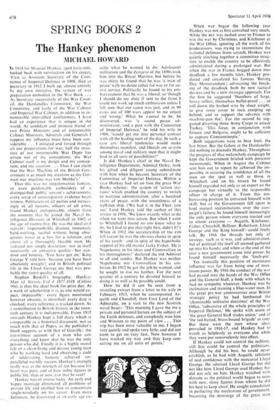SPRING BOOKS 2 The Hankey phenomenon
MICHAEL HOWARD
In 1918 Sir Maurice Hankey, aged forty-one, looked back with satisfaction on his career, 'First as Assistant Secretary of the Com- mittee of Imperial Defence in 1908, then as fiecretary in 1912 I built up, almost entirely by my own initiative, the system of war preparation embodied in the War Book . As Secretary successively of the War Coun- cil, the Dardanelles Committee, the War Committee, and lastly of the War Cabinet and Imperial War Cabinet, in addition to in- numerable inter-allied conferences, I have had an experience that is unique in the world. As confidant and intimate friend of two Prime Ministers and of innumerable Cabinet Ministers, Admirals and Generals I suppose my influence must have been con- siderable . . . I initiated and forced through all our preparations for war; half the struc- ture of our innumerable War Depts has arisen out of my conceptions; the War Cabinet itself is my design and my concep- tion; and my creation . . . Thus 1 can claim that the War Machine of the British Gov- ernment is as much my creation as the Ger- man war machine was von Moltke's.'
That this was no megalomaniac fantasy, or even pardonable embroidery of a distinguished public servant's achievements, every scrap of contemporary evidence bears witness. Politicians of all parties and increas- ingly of all nations, officers of all arms, found Hankey indispensable, almost from the moment that he joined the Naval In- telligence Division in Whitehall in 1902 at the age of twenty-five. He was the ideal civil servant: imperturbable, discreet, immensely hard-working, tactful without being obse- quious, never at a loss for a solution, and above all a thoroughly likeable man. He radiated not simply discretion—not in itself necessarily an attractive quality—but can- dour and honesty. 'You have got on,' King George V told him, 'because you have been absolutely straight'; and in British political life in the Lloyd George era that was pro- bably the rarest quality of all.
Stephen Roskill's biography, Hankey: Man of Secrets Vol 1 1877-1918 (Collins 90s), is thus the ideal book for prize day. As a work of scholarship it is, as one would ex- pect, impeccable: every figure mentioned however obscure, is identified; every date is checked; every reference is tracked down. As a contribution to British history in the twen- tieth century it is indispensable. From 1915 onwards Hankey kept a full diary which is comparable as a historical document, not so much with that of Pepys, as the publisher's blurb suggests, as with that of Greville: the eye-witness account of a man who saw everything and knew that he was the only person who did. Finally it is a highly moral tale of a clean-living and devout young man who by working hard and observing a code of undeviating honesty achieved un- paralleled worldly success. Hankey's strength really was as the strength of ten because his heart was pure, and of how mlIny figures in public life, then or now, can that be said?
Hankey was of course lucky. An early and happy marriage eliminated all problems of private life and enabled him to concentrate single-mindedly on his career. Even more fortunate, he discovered at an early age ex-
actly what he wanted to do. Adolescent militarism and the Zeitgeist of the 1890s took him into the Royal Marines, but before he was thirty he found that he was 'a man of peace' with no desire either for war or for ac- tive service. Politically he found to his em- barrassment that he was a liberal, so 'though I should do my duty if sent to the front I could not work up much enthusiasm unless I felt sure that our cause was just, and in 99 cases out of 100 wars appear to me unjust and wrong.' What he wanted to be, he discovered, was 'a sound peace ad- ministrator; and a post with the Committee of Imperial Defence,' he told his wife in 1906, 'would get me into personal contact with all the leading men of the day. In such a case any liberal tendencies would make themselves manifest, and liberals are so rare among naval and military men that it might lead to all sorts of possibilities!'
It did. Hankey's chief in the Naval In- telligence Department, Admiral Ottley, took his gifted and diligent young subordinate with him when he became Secretary of the Committee of Imperial Defence. Within a year Hankey had set on foot the great War Books scheme: the system of 'action sta- tions' which enabled the country to switch to wartime administration, after a hundred years of peace, with the smoothness of a well-run ship. ('We had it in the Fleet, you see,' Lord Hankey told the author of this review in 1956. 'We knew exactly what to do when we went into action. But when I went to Whitehall I found no one knew what to do. So I had to put that right first, didn't IV) When in 1912 the secretaryship of the CID fell vacant he was the obvious choice in spite of his youth—and in spite of the hyperbolic support of his old master Jacky Fisher. 'He is Napoleonic in his ideas and Cromwellian in his thoroughness!' declared the old Admiral to all and sundry. But Hankey was neither Napoleonic nor Cromwellian in his am- bition. In 1912 he gof the job he wanted, and he sought to rise no further. For the next quarter of a century he devoted himself to doing it as well as he possibly could.
How he did it can be seen from a revealing extract from a letter to his wife in February 1913, when he accompanied As- quith and Churchill, then First Lord of the Admiralty, on a visit to the new Scottish naval bases: 'This morning I gave the PM a private and personal lecture on the subject of the Forth defences, and completely won him and Winston to my point of view. . . This trip has been most valuable to me. I began very quietly and spoke very little, and did not seem to get on very fast. Now however I have worked my way and they keep con-i suiting me on all sorts of points.' When war began the following year Hankey was not at first consulted very much. While the BEF was rushed over to France to win the war by Christmas, and Kitchener at the War Office, ignoring all the work of his predecessors, was trying to reconstitute the national defences from scratch, Hankey was quietly stitching together a committee struc- ture to enable the country to be effectively administered during a prolonged war. But when the war in France bogged down into deadlock a few months later, Hankey pro- duced and circulated his famous 'Boxing Day Memorandum'; advocating the break- ing of the deadlock both by new tactical devices and by a new strategic approach. For the first he suggested 'Numbers of large, heavy rollers, themselves bullet-proof . .. to roll down the barbed wire by sheer weight, to give some cover to men creeping up behind, and to support the advance with machine-gun fire'. For the second he sug- gested diverting three Army Corps to attack Turkey. 'This force, in conjunction with Greece and Bulgaria, ought to be sufficient to capture Constantinople.'
Both suggestions were to bear fruit, the last bitter. But the failure at the Dardanelles did nothing to discredit Hankey. Throughout the progress of that melancholy campaign he kept the Government briefed with prescient memoranda. When in August the Cabinet sent him out to report he achieved the im- possible in securing the confidence of all the men on the spot as well as those in Whitehall, and on his return he found himself regarded not only as an expert on the campaign but virtually as the responsible officer in charge of it. From this em- barrassing position he extracted himself with skill; but as the Government fell apart in loud mutual recriminations over the cam- paign's failure, he found himself increasingly the only person whom everyone trusted and to whom everyone — Asquith, Kitchener, Fisher, Churchill, Balfour, Robertson, Lloyd George and the King himself—could freely talk. By 1916 the threads not only of strategy, such as it was, and administration, but of political life itself all seemed gathered up into his hands; and when at the end of the year a new government came into power, he found himself necessarily the 'finch-pin'. Yet ironically this position of maximum influence was far from being one of max- imum power. By 1916 the conduct of the war had passed into the hands of the War Office and the General Staff, a body with which he had no sympathy whatever. Hankey was by inclination and training a blue-water man. In the great pre-war controversies over British strategic policy he had lambasted the 'abominable militarist doctrines' of the War Office, 'subversive of the whole principles of Imperial Defence.' He spoke with scorn of 'the great General Staff trades union,' and of
'the red-hatted, brass-bound brigade' at GHQ. But these were the men whose ideas prevailed in 1916-17, and Hankey had to watch as helplessly as everyone else while they were put remorselessly into effect.
If Hankey could not control the military, still less could he control the politicians.
Although he did his best, he could never establish, as he had with Asquith, relations of real confidence with the mercurial Lloyd George. He admired Lloyd George but did not like him. Lloyd George used Hankey but did not rely on him. Hankey watched with distaste as the political world began to teem
with new, slimy figures from whom he did his best to keep aloof. He sought consolation in perfecting the mechanism of government, becoming the demiurge of the great state
machine which the war brought into being. He fashioned, as he rightly claimed, the War Cabinet. He created its secretarial mechanism He could not make decisions—seldom indeed could he influence them in the Lloyd George era—but he could see that decisions once made were recorded and carried out. He could and did ensure that the incredible confusion of government which characterised the last year of As- quith's administration was not repeated under his successor.
Nor indeed under any of his successors. Hankey was the first of a line of calm, clear- headed, sad-eyed officials who have sat through brawling Cabinet meetings during the past fifty years, charting the reefs between which their masters must steer, offering advice when asked for it and keep- ing silence when not, ensuring that govern- ment policy, whatever they may privately think of it, is expeditiously carried out. To the outsider they seem figures of vast occult power. They themselves—if they are any good—know how little they really possessi Real power is for politicians, who pay a ter- rible price for the privilege of wielding it. The Hankeys of this world, meditating in retirement in the Athenaeum and the House of Lords, have to end their life on a ques- tion mark. 'I suppose my influence must have been considerable d ?'







































 Previous page
Previous page